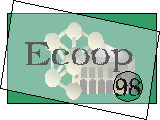
 |
|
Business rules are nothing new. They are used by every organisation to state their practices and policies. Every business application contains many business rules. Analysis and design models specify business rules without explicitly indicating them. Actual tools and environments for building business applications, however, provide little or no support to deal explicitly and automatically with business rules during the software life cycle.
This workshop focuses on tools and environments that handle the semantic content of business rules in an object-oriented environment. The main goal is to provide an overview of possible techniques (tools and methods) for the handling, definition and checking of these rules and the constraints expressed by them during design and development of object-oriented software.
Some of the purposes of this workshop are:
Current software engineering tools provide inadequate support to explicitly and automatically deal with business rules when building object-oriented business applications. With this workshop we want to investigate which tool and environmental support for handling business rules during software development and evolution is needed and/or desired and which is already available. To come to a categorisation of available support tools and techniques, we solicit position papers from both academia and industry.
Amongst others, the workshop will focus on the following topics:
Special attention will be directed towards object-oriented approaches and the role of constraints in specifying business rules.
1. Dirk Bontridder (d.bontridder@olsy.be )
2. Alain Grijseels (a.grijseels@olsy.be )
3. Kim Mens (kimmens@vub.ac.be ) (official contact person)
4. Roel Wuyts (rwuyts@is1.vub.ac.be )
Roel Wuyts obtained a degree of licentiate in Computer Science in 1996 at the Vrije Universiteit Brussel and is currently a Ph.D. student on an I.W.T. scholarship granted by the Flemish Government. As a member of the Programming Technology Lab, he is currently researching how to express different design paradigms in a declarative programming language. He also participates in the Reuse Contract project. Roel is planning to finish his Ph.D. in the fall of 2000.
Deadline for submission: Extended to June 15th, 1998 (this deadline is STRICT) Notification of acceptance: June 22th, 1998 Final version: June 29th, 1998 Day of workshop: July 21st, 1998Please note that workshop participants must register at least on that day of the ECOOP conference. Deadline for early registration for the ECOOP'98 conference is Friday, June 19th.
A selection of the best contributions will be invited for presentation during the first part of the workshop where at least two or more of the topics mentioned above will be addressed.
In the second part of the workshop, small working groups, composed of both industrial participants and researchers, will be asked to focus on specific problems such as how to use constraints for specifying business rules, how to enforce business rules, how to do compliance checking, how to deal with reuse and evolution of business rules, how to generate code from business specifications, and so on.
In the final part, the results of the small working groups will be merged and discussed with all participants.
Proceedings will be printed as technical documentation by Olsy Belgium and will be available at the day of the conference. An official Ecoop'98 Workshop Reader will be published after the conference.
Each participant should submit a position paper of maximum 5 pages length, together with a number of topics or questions (at least 2) that she or he would like to see discussed during the workshop. We like the submitters to give, besides the actual content of the paper, a definition of " business rule" and "constraint" to be sure of the correct understanding of the content of the submitted papers.
A selection of interesting papers will be made by the organisers of the workshop. The authors of these papers will have the opportunity to present them in about 25 minutes. Workshop participants are invited to submit their contribution by e-mail to either one of the workshop organisers by May 22nd (see Important dates). Any of the following formats are allowed: HTML, ASCII, PostScript, MSWord (please mention version and platform !). HTML submissions are preferred.
A number of other workshops at ECOOP'98 will be devoted to the theme of using object-oriented techniques in business applications development. Nevertheless, there is a clear distinction between the different workshops. (A general home-page describing all related workshops is available.) If your interest is more focused on the tools and environments that are needed and/or desired for handling business rules during software development and evolution you should select our workshop. The workshop titled "What's Wrong with OO - Requirements for an OO Business Process Model" focusses on constructing a particular object-oriented business process model. Finally, the workshop on precise behavioural semantics focuses on the common concepts and constructs used to specify behavioural semantics throughout the lifecycle, on rigourous ways to represent them and to reuse specifications. For more information, see: